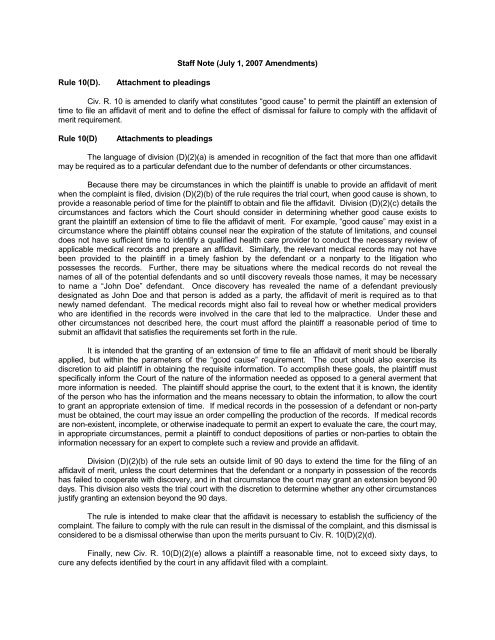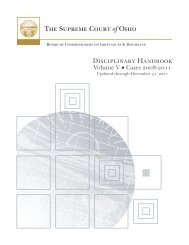Ohio Rules of Civil Procedure - Supreme Court
Ohio Rules of Civil Procedure - Supreme Court
Ohio Rules of Civil Procedure - Supreme Court
You also want an ePaper? Increase the reach of your titles
YUMPU automatically turns print PDFs into web optimized ePapers that Google loves.
Rule 10(D). Attachment to pleadings<br />
Staff Note (July 1, 2007 Amendments)<br />
Civ. R. 10 is amended to clarify what constitutes “good cause” to permit the plaintiff an extension <strong>of</strong><br />
time to file an affidavit <strong>of</strong> merit and to define the effect <strong>of</strong> dismissal for failure to comply with the affidavit <strong>of</strong><br />
merit requirement.<br />
Rule 10(D) Attachments to pleadings<br />
The language <strong>of</strong> division (D)(2)(a) is amended in recognition <strong>of</strong> the fact that more than one affidavit<br />
may be required as to a particular defendant due to the number <strong>of</strong> defendants or other circumstances.<br />
Because there may be circumstances in which the plaintiff is unable to provide an affidavit <strong>of</strong> merit<br />
when the complaint is filed, division (D)(2)(b) <strong>of</strong> the rule requires the trial court, when good cause is shown, to<br />
provide a reasonable period <strong>of</strong> time for the plaintiff to obtain and file the affidavit. Division (D)(2)(c) details the<br />
circumstances and factors which the <strong>Court</strong> should consider in determining whether good cause exists to<br />
grant the plaintiff an extension <strong>of</strong> time to file the affidavit <strong>of</strong> merit. For example, “good cause” may exist in a<br />
circumstance where the plaintiff obtains counsel near the expiration <strong>of</strong> the statute <strong>of</strong> limitations, and counsel<br />
does not have sufficient time to identify a qualified health care provider to conduct the necessary review <strong>of</strong><br />
applicable medical records and prepare an affidavit. Similarly, the relevant medical records may not have<br />
been provided to the plaintiff in a timely fashion by the defendant or a nonparty to the litigation who<br />
possesses the records. Further, there may be situations where the medical records do not reveal the<br />
names <strong>of</strong> all <strong>of</strong> the potential defendants and so until discovery reveals those names, it may be necessary<br />
to name a “John Doe” defendant. Once discovery has revealed the name <strong>of</strong> a defendant previously<br />
designated as John Doe and that person is added as a party, the affidavit <strong>of</strong> merit is required as to that<br />
newly named defendant. The medical records might also fail to reveal how or whether medical providers<br />
who are identified in the records were involved in the care that led to the malpractice. Under these and<br />
other circumstances not described here, the court must afford the plaintiff a reasonable period <strong>of</strong> time to<br />
submit an affidavit that satisfies the requirements set forth in the rule.<br />
It is intended that the granting <strong>of</strong> an extension <strong>of</strong> time to file an affidavit <strong>of</strong> merit should be liberally<br />
applied, but within the parameters <strong>of</strong> the “good cause” requirement. The court should also exercise its<br />
discretion to aid plaintiff in obtaining the requisite information. To accomplish these goals, the plaintiff must<br />
specifically inform the <strong>Court</strong> <strong>of</strong> the nature <strong>of</strong> the information needed as opposed to a general averment that<br />
more information is needed. The plaintiff should apprise the court, to the extent that it is known, the identity<br />
<strong>of</strong> the person who has the information and the means necessary to obtain the information, to allow the court<br />
to grant an appropriate extension <strong>of</strong> time. If medical records in the possession <strong>of</strong> a defendant or non-party<br />
must be obtained, the court may issue an order compelling the production <strong>of</strong> the records. If medical records<br />
are non-existent, incomplete, or otherwise inadequate to permit an expert to evaluate the care, the court may,<br />
in appropriate circumstances, permit a plaintiff to conduct depositions <strong>of</strong> parties or non-parties to obtain the<br />
information necessary for an expert to complete such a review and provide an affidavit.<br />
Division (D)(2)(b) <strong>of</strong> the rule sets an outside limit <strong>of</strong> 90 days to extend the time for the filing <strong>of</strong> an<br />
affidavit <strong>of</strong> merit, unless the court determines that the defendant or a nonparty in possession <strong>of</strong> the records<br />
has failed to cooperate with discovery, and in that circumstance the court may grant an extension beyond 90<br />
days. This division also vests the trial court with the discretion to determine whether any other circumstances<br />
justify granting an extension beyond the 90 days.<br />
The rule is intended to make clear that the affidavit is necessary to establish the sufficiency <strong>of</strong> the<br />
complaint. The failure to comply with the rule can result in the dismissal <strong>of</strong> the complaint, and this dismissal is<br />
considered to be a dismissal otherwise than upon the merits pursuant to Civ. R. 10(D)(2)(d).<br />
Finally, new Civ. R. 10(D)(2)(e) allows a plaintiff a reasonable time, not to exceed sixty days, to<br />
cure any defects identified by the court in any affidavit filed with a complaint.

















